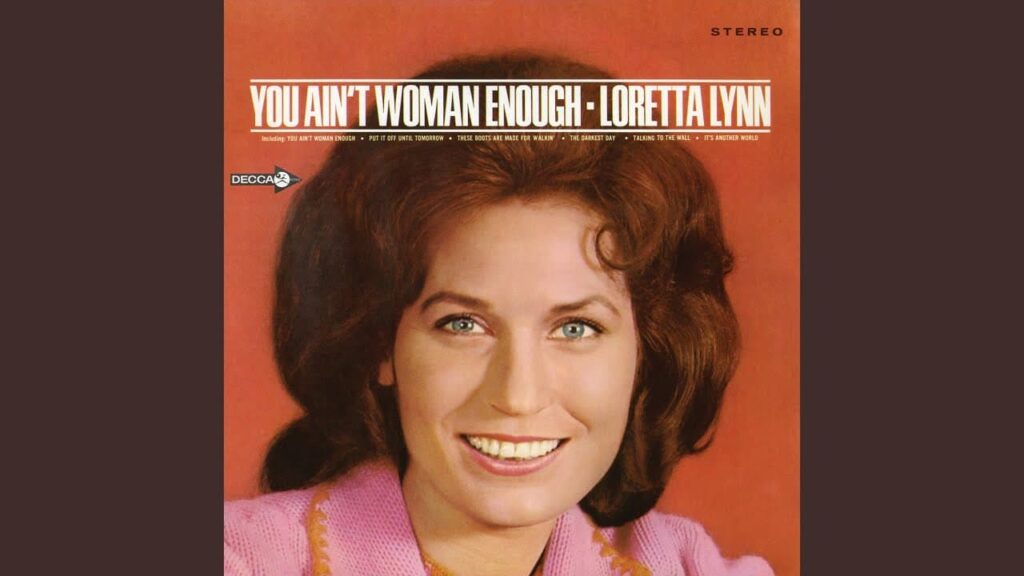
A Fearless Anthem: The Unyielding Power of a Woman Scorned
Let’s journey back in time, shall we, to an era when country music spoke with an unflinching honesty, when its stories resonated with the lived experiences of everyday people. Today, we turn our attention to a true titan of the genre, a woman whose voice carried the weight of experience and the fire of defiance: Loretta Lynn and her scorching 1966 classic, “You Ain’t Woman Enough (To Take My Man).” This was more than just a song; it was a declaration, a warning shot fired across the bow, and an enduring anthem for women everywhere who refuse to be overlooked or underestimated. It distilled a universal feeling of righteous indignation into three minutes of pure, unadulterated strength.
When Loretta Lynn released “You Ain’t Woman Enough (To Take My Man)” in May of 1966, it wasn’t just a hit; it was a phenomenon that cemented her status as the “Coal Miner’s Daughter” and a fearless voice for working-class women. The song soared to number 2 on the Billboard Hot Country Singles chart, a remarkable achievement that underscored its immediate and widespread appeal. It was the title track of her album, also released in 1966, “You Ain’t Woman Enough,” which further solidified its place in country music history. This song followed a string of successful singles like “Dear Uncle Sam” and “Blue Kentucky Girl,” but “You Ain’t Woman Enough” had a different kind of fire, a directness that truly set it apart. It spoke to a common, deeply felt human experience with a bold confidence that was, at the time, still quite revolutionary for a female artist in country music.
The story behind “You Ain’t Woman Enough (To Take My Man)” is a testament to Loretta Lynn’s remarkable ability to transform real-life experiences into powerful, relatable art. The genesis of the song came from a very personal encounter. Lynn recounted that she was performing a show one night when a woman approached her backstage, clearly smitten with Lynn’s husband, Doo. This woman made some rather bold, even aggressive, overtures. Instead of reacting with anger or tears, Lynn, ever the astute observer and masterful songwriter, saw the situation as prime material for a song. She famously turned to her husband and quipped, “You know, she ain’t woman enough to take my man.” The phrase, delivered with Loretta’s characteristic wit and a touch of defiance, immediately clicked, becoming the central lyrical hook. She then proceeded to write the song, drawing from this direct confrontation and undoubtedly countless other similar unspoken anxieties or minor flirtations she or her friends might have witnessed over the years. This isn’t a song born of pure fiction; it’s rooted deeply in the lived reality of relationships and the territorial instincts that can arise when a perceived threat appears.
The meaning of “You Ain’t Woman Enough (To Take My Man)” is crystal clear: it’s a powerful declaration of female strength, self-worth, and unwavering possessiveness in a relationship. It’s a woman putting another woman on notice, asserting her claim and dismissing any perceived rival as utterly inadequate. The lyrics are direct and confrontational, with lines like “You’ve been a-havin’ fun with my man, that’s what you told me / But you better stop a-tryin’ to steal him, ’cause I’m gonna hold him.” It’s not about begging or pleading; it’s about confidence and a refusal to be intimidated. The song also subtly touches on the idea that the “other woman” is perhaps misguided or lacking the true qualities necessary to hold a man, emphasizing the established bond and history between the singer and her partner. It’s an assertion of dominion, a powerful statement that the relationship is hers and hers alone, built on foundations that cannot be easily swayed by fleeting attractions.
For those of us who grew up listening to Loretta Lynn, this song brings back a torrent of memories. It might evoke recollections of strong women in our own lives – mothers, aunts, grandmothers – who faced their challenges head-on with a similar spirit. It was the kind of song that played on the radio as you drove down dusty backroads, or hummed along to during chores, feeling a surge of quiet power. Loretta Lynn‘s vocal performance on this track is simply iconic. Her voice, infused with a raw, no-nonsense quality, delivers each lyric with conviction and an unmistakable edge. There’s no pretense, no artifice; just pure, unadulterated conviction. She doesn’t just sing the words; she embodies the very spirit of a woman who knows her worth and isn’t afraid to defend what’s hers. This song resonated deeply because it gave voice to feelings many women had but rarely expressed so openly in public. It was empowering, a reminder that vulnerability doesn’t preclude strength, and that a woman’s claim to her love can be fiercely defended. It remains a timeless anthem, a testament to Loretta Lynn‘s enduring legacy as a trailblazer who sang about life as she knew it, with all its joys, sorrows, and defiant moments.